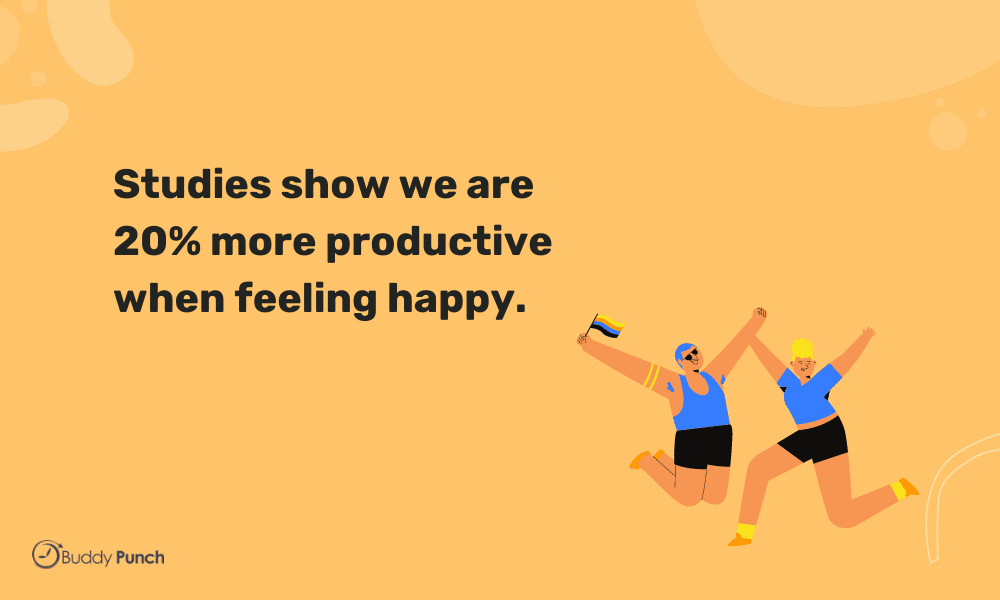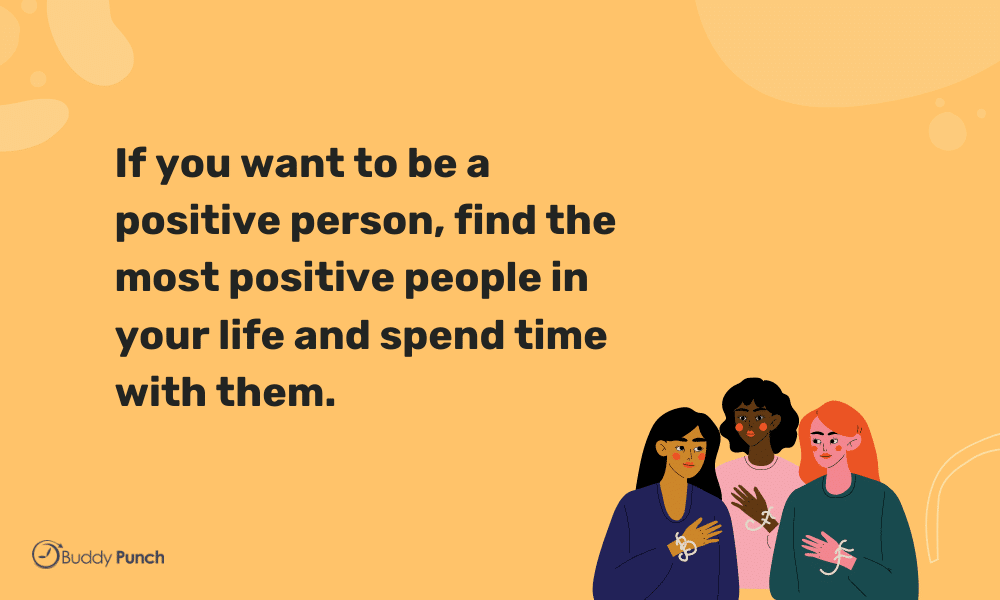How to Keep a Positive Attitude at Work

You might be the best worker to have ever set foot through the doors of your company — but if you don’t have the right attitude, you still won’t get far.
A positive attitude is more than just smiling often and acting cheerful when others are around. It’s a way of looking at the world with optimism and hopefulness, where others would only see obstacles and dead ends.
And it’s necessary to a happy and successful professional life.
While it would be nice to be effortlessly joyful at the office every day, work is a stressful environment. It can bring out negative attitudes all too easily; trying to juggle deadlines, irritating coworkers, and different personality dynamics can make it feel impossible to cultivate a daily positive attitude.
In this post, we’ll delve deeper into why a positive attitude is essential and give you 13 helpful tips for developing a positive outlook in your workplace.
Why Should You Strive to Have a Positive Attitude at Work?
Employees who demonstrate a good attitude are more satisfied at work, have better relationships with their colleagues and are seen as good candidates for promotion. What’s not to love?
While stress hurts your health and deteriorates your immune system, positivity helps you feel more relaxed and joyful, which leads to better overall health.
You can keep the pressure at bay by reframing everything in a positive light, allowing your body to stop sending fight-or-flight responses throughout the workday.
Not only will a positive attitude improve your physical health, but your productivity at work will improve. Studies show that you’re 20% more productive when you’re feeling happy.
Having a positive attitude will also give you a better reputation in the office. Since people are naturally drawn to positive people, your colleagues will start feeling comfortable coming to you for advice and help.
They’ll begin to see you as a role model, and your supervisors won’t fail to notice.
Your positivity will help you become a leader — first in your peers’ eyes and then your managers’ eyes. Before you know it, you’ll be first on their minds when it comes time for a promotion.
In fact, a positive attitude is one of the top 10 characteristics employers look for in a new hire. They know that positivity breeds productivity, not to mention it’s the number one indicator of whether the employee will be easy (and enjoyable) to work with.
How do you develop positivity that will slingshot you to better health, relationships, and professional success?
Let’s look at 13 habits you can put into practice right away.
1. Take Time to Self Assess and Take Deep Breaths
Maintaining a positive attitude means reacting with a level head when something upsetting happens and letting it roll off you whenever possible.
It’s never a good idea to react out of anger. If something happens to upset you, try to develop a habit of taking a beat before responding:
- If you can, move to a private location like your office or cubicle — or, in dire straits, a bathroom stall — to compose yourself.
- Close your eyes and take at least ten deep breaths. Deep breathing is a quick hack to calm your body. Perhaps repeat a calming mantra, picture your “happy place,” or whatever works for you.
- Then, try to assess the situation with a clinical eye. Can you try to view the event through the eyes of all the participants?
Once you’re calmer, you’ll start to put the event into perspective and develop an appropriate response that won’t be blown out of proportion.
2. Don’t Take Criticism Personally
If someone criticizes your work, try to remember it probably wasn’t personal. Don’t dwell on it and spiral into bad attitude habits.
Work on listening to what the person is saying rather than jumping straight into defensiveness. Try to put yourself in their shoes and understand where they’re coming from.
Do they have more experience or know-how that makes their critique valid? Is there something you can learn from their different perspective?
Even if you disagree with the feedback they’ve given you, you can learn from it. Don’t dismiss it. Instead, try to look at it objectively.
Often, well-meaning people try to help, but their feedback comes off as critical or offensive. Try to assume the best intentions in people and look for ways to learn from their critique and improve your performance.
After all, no one’s ever done learning.
Your work always has room to grow — so rather than reacting poorly to criticism and creating a negative cycle, use the feedback you receive as an opportunity to grow professionally.
3. Spend Time With People Who Have a Positive Attitude
They say you’re a combination of your five closest friends, so it makes sense that your work persona would reflect the colleagues you spend the most time with. This principle can affect you for good or ill.
If you want to be a positive person, seek out the most positive people in your life and spend time with them.
For the same reason, try to avoid socializing with negative coworkers who spend all their free time complaining about work. Positivity might be contagious, but so is negativity.
Look for the people at your office who exhibit the most positivity. Try to find cheerful people, have a can-do attitude, and seem to like being at work.
Look for those who always have new ideas or seem to have interesting hobbies and interests outside of work. Those are going to be the most well-rounded and emotionally healthy people.
Make a point of gravitating towards them as much as possible, and you’ll find that their positive energy will rub off on you. And like a chain of falling dominoes, your positive outlook will start to infect the rest of your team and foster a positive, thriving environment.
4. Be Kind and Help Your Colleagues
Your coworkers spend at least 40 hours a week with you, so it’s a sound investment to cultivate a positive relationship with them and help each other.
The benefits are twofold: you’ll start to make friends, which will make you look forward to coming to work. You’ll also feel more of a positive social connection at work, making you more involved and motivated to do a good job.
Make it your goal to put teamwork first. Let your colleagues know when they’ve done an excellent job, and act happy for them when they succeed.
Don’t let jealousy get the best of you; professional success isn’t a zero-sum game. A rising tide lifts all boats, after all.
Once you start putting your team first and treating your coworkers kindly, they’ll begin to see you as a friend and ally in the workplace. This will naturally improve your experience at work since it’ll be a friendlier environment for you.
Not only does kindness create social gains for you, but according to a study in the Journal of Social Psychology, being kind to someone gives your brain a happiness boost.
Journal of Happiness Studies found that remembering an act of kindness makes us want to do it again.
So, doing something kind for others helps make you happier, and it can quickly snowball into a habit of kindness and generosity that will improve your life and the lives of those around you.
5. Feed Your Mind With Positivity
Ever heard the phrase “you are what you eat”? Similarly, your mind reflects what you feed it.
If you’re taking in depressing news and scrolling through angry social media feeds during your breaks, that negativity will naturally affect your mental state.
Instead, try incorporating movement into your breaktime by going for a walk outside or circulating the office. Listen to uplifting music or educational podcasts on your morning commute.
Embrace learning new things, and try to stay curious. Always have something new you’re excited to learn about — this will help fill your mind with positive thoughts and exciting possibilities.
One word of warning, though: it’s never a good idea to repress your emotions, so don’t shove genuinely negative feelings down or ignore them.
Acknowledge your feelings, and don’t judge yourself for feeling them. But in the everyday annoyances of daily life, try to build a habit of using positive language.
6. Take Responsibility for Your Actions
Don’t be the kind of person who never owns up to a mistake.
When that happens, the positive atmosphere in the office is immediately destroyed. Not taking responsibility for your actions can cause resentment among your coworkers who know you were at fault.
When a supervisor or coworker gives you constructive feedback, don’t get defensive or pass the buck. In the long run, everyone will respect you more if you own up to your mistakes and show you aren’t too proud to be proven wrong.
And if you acknowledge your mistakes, you’ll be in a mindset to correct the behavior, learn, and grow from the experience.
You’ll have more faith in your ability to control the things in your life, instead of teaching yourself to always feel like a victim.
Remember that while you can’t control everything that happens to you, you can control how you respond.
7. Deal With Problems Professionally
In the workplace, problems will inevitably arise that hinder you from having a positive attitude. When something happens that makes it hard for you to operate at peak efficiency, take action to resolve it as best you can.
Leaving a problem unaddressed is a recipe for resentment and built-up negativity. Instead, approach the issue with openness and respect.
Go through the proper channels, depending on the issue; if it’s a procedural or systemic issue, ask for facetime with your supervisor to address the problem and suggest alternatives.
If it’s an individual’s actions, approach them privately and try to resolve the disagreement before bringing it to the upper ranks.
While there’s a time and place for constructive feedback, make sure you’re not criticizing your coworkers. If you have a problem with something they’ve done, try to handle the situation politely and professionally.
Bring the conversation somewhere private, be direct, and make sure to use “I feel…” rather than “you always do…” language.
8. Be Mindful: Ask Questions and Don’t Jump to Conclusions
One crucial way to stay positive is to keep your assumptions in check. If someone does or says something that seems wrong to you, you should make sure not to jump to conclusions that would harm the positive office environment.
Research suggests that people who make assumptions about a situation tend to presume the worst-case scenario. Jumping to conclusions without all the facts is training yourself always to think negatively and expect the worst, which can be harmful not only to your mental well-being but also to your relationships.
Before you respond to the person, pause to ask yourself if any unconscious biases cloud your judgment. You don’t want to make assumptions about a person’s motivations or where they’re coming from based on stereotypes or subtle outside influence.
Instead, try to take everything at face value. If something a person says or does seems off, ask questions to clarify what you don’t understand.
Maybe you can help the person realize they’re acting oddly without making them defensive — or you can better understand their perspective and recognize you were the one who wasn’t seeing the bigger picture.
9. Practice Gratitude (No One Owes You Anything)
One of life’s great lessons is that life isn’t fair. The more we expect it to be, the more disappointed and resentful we can become.
Similarly, try to remember that no one owes you anything. One of the easiest ways to destroy a positive attitude is to develop a sense of entitlement. Feeling like the world owes you can easily lead you into passive-aggressive behavior and permanent identity of victimhood.
Instead, work on developing a practice of gratitude. Try:
- Keeping a gratitude journal.
- Telling yourself encouraging mantras, like “I don’t let hard times stop me” or “it’s on me to make things happen.”
- Reframing problems as an opportunity for growth and creative solutions.
- Smiling — you’ll feel genuinely happier, and sometimes, you have to fake it ‘til you make it.
Make it your goal to look at each hurdle with a “glass half full” perspective. You’ll always run into bad days, like a flat tire on the way to work or your favorite sports team suffering a humiliating loss the night before, but try not to let yourself dwell on those things.
When you’re given a new assignment at work, for example, try saying something like “sounds interesting!” or “let’s do this!” instead of “oh no” (even if you’re joking).
Focus on vocalizing the positive things and leaving the negative thoughts unsaid, and you’ll be amazed at how the simple words you use impact your outlook on everyday events.
10. Stop Complaining (Be Proactive About Your Issues)
No matter how positive you plan to be, there will always be those colleagues, customers, or tasks that will do their best to get under your skin.
While it’s tempting to complain about an irritating coworker or an inconvenient office policy, it won’t help you. The person you’re complaining to will have their attitude ruined or start to see you as a negative person (or both).
And dwelling on the objects of your complaint won’t do your outlook any favors, either. It just helps build up your dissatisfaction at work.
The best thing you can do instead?
Acknowledge beforehand that something or someone upsets you, and decide that you won’t let them bother you anymore.
If it’s something you can’t change, like a demanding client, you aren’t doing yourself any favors by giving them control of your emotions.
Expect the irritating behavior so that it doesn’t take you by surprise. Decide to let it roll off of you. You’d be surprised by how much of a difference a little mental preparation will make.
11. Give Yourself a Chance to Recharge
No one can function at 100% all day, every day! Your brain needs downtime. Take yourself out for lunch, go for a walk around the block, or treat yourself to a coffee break.
In the same vein, try not to take your work home with you. You need your off hours to rest, recharge, and give yourself a break from the office.
Leaving work at work will help you unwind and return the next morning refreshed and ready to tackle the day cheerfully.
Spending time with family and indulging in your favorite hobby will do wonders for your mental capacity for a good attitude at work, and help you avoid burnout.
A good night’s sleep will also do wonders for your attitude.
Practice a healthy bedtime routine by turning off screens in the hour before bed, setting your bedroom to a comfortable temperature, and doing relaxing activities before bed like a warm bath, gentle stretching, or reading a nice book to help you fall asleep more easily.
Experts agree that getting enough sleep makes you:
- More productive
- Happier and more able to process emotions
- More active and energetic
- Healthier overall
It’ll be easier to come to work with the right attitude when you’ve had a chance to unplug from work and indulge in rest and self-care.
12. Think About Your Career Goals and Dreams
Remember not to overload yourself with work, if you can help it. If you’re the kind who has trouble turning down opportunities, keep in mind that you should always focus on your career goals when deciding whether to take on new projects or responsibilities.
If you don’t have a personal mission statement, make one. Having an idea of your ideal self will help you reframe everything through this lens.
Take some time to decide the value (or values) that you want to live life by. Write them down along with your professional goals, and keep them somewhere accessible.
Long-term goals will also help you have a focal point when work gets busy in the short-term.
A far-reaching purpose will help you keep a positive and optimistic attitude in the present while feeling directionless is a recipe for negativity and resentment.
13. Avoid Gossip
There are few things more poisonous to a work environment than gossip. It creates an atmosphere of mistrust — and everyone starts to suspect that others are talking behind their backs.
Your team members (or even superiors) might try to gossip to you about other members of your organization or people in their personal life.
Do your best to avoid participating in such destructive conversations, and if you find yourself unable to escape the situation, play the role of a mute listener.
Don’t engage with gossip or encourage it in any way. If you feel able to, you can also say, “I don’t feel comfortable talking about this anymore.”
It can be hard to find the line between conversational chit-chat and destructive gossip; however, once you start discussing someone behind their back, you can be sure you’ve crossed the line.
Positivity Is Key to Your Professional Success
While it may seem like a positive attitude at work is a pipedream (or reserved for those too-cheerful coworkers who are hyped up on coffee), positivity is much more accessible than that.
You can train yourself to be positive by surrounding yourself with positive people and filling your mind with positive thoughts. Consciously decide to be kind to others, own your mistakes, and avoid complaining and gossiping.
Cultivating a positive attitude is not only doable; it’s necessary for developing lasting relationships with coworkers and a good impression with your managers.
Plus, a good attitude makes life more fun!





